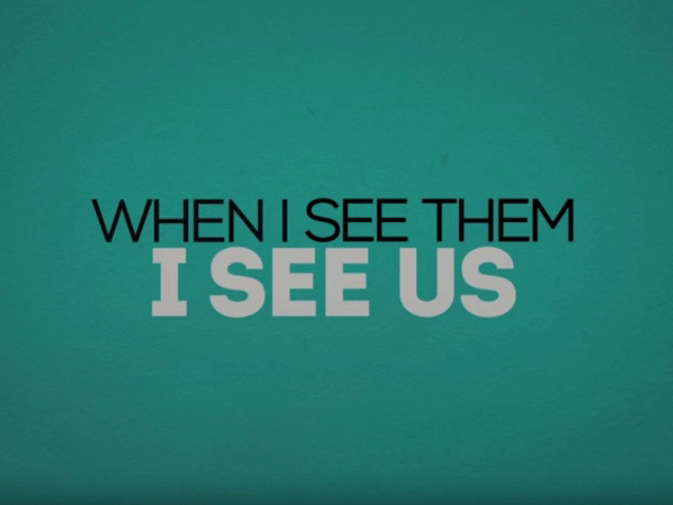Palestinian and #BlackLivesMatter activists unite in video
The YouTube video leads with the slogan 'when I see them I see us'

Your support helps us to tell the story
From reproductive rights to climate change to Big Tech, The Independent is on the ground when the story is developing. Whether it's investigating the financials of Elon Musk's pro-Trump PAC or producing our latest documentary, 'The A Word', which shines a light on the American women fighting for reproductive rights, we know how important it is to parse out the facts from the messaging.
At such a critical moment in US history, we need reporters on the ground. Your donation allows us to keep sending journalists to speak to both sides of the story.
The Independent is trusted by Americans across the entire political spectrum. And unlike many other quality news outlets, we choose not to lock Americans out of our reporting and analysis with paywalls. We believe quality journalism should be available to everyone, paid for by those who can afford it.
Your support makes all the difference.The video below, published on YouTube on Wednesday, features dozens of #BlackLivesMatter and Palestinian activists delivering a joint message. "When I see them, I see us," the video's narrators intone.
These include prominent African American celebrities and thinkers, such as Danny Glover, Lauryn Hill, Alice Walker, Angela Davis and Cornel West. They are accompanied by well-known Palestinian activists and writers. Over the course of a couple of minutes, they unite their perceived struggles through photos, slogans and a shared story of state oppression.
They talk of black youths killed by police and Palestinian children bombed by Israeli warplanes.
YouTube/Black-Palestinian Solidarity
"When I see them, I see us," the narrative goes. "Harassed, beaten, tortured, dehumanized, stopped and frisked, searched at checkpoints."
It may seem a bit of a stretch to equate the grievances of Palestinians with questions of institutionalized racism in the United States. After all, the legacy of African slavery and systemic racism in the United States seems a world away from the ongoing Israeli occupation of the Palestinian territories.
But Noura Erakat, an assistant professor at George Mason University and one of the organizers of the video project, argues that while these experiences are separated by distance and history, there are important underlying themes that bring them together.
"Here were two groups of people dealing with completely different historical trajectories, but both which resulted in a process of dehumanization that criminalized them and that subject their bodies as expendable," Erakat told Al Jazeera America. "Not only were their lives more vulnerable and disposable, but that even in their death, they were blamed for their own death."
The video project emerged last year in the aftermath both of the Ferguson protests in the United States and the Gaza war, where more than 2,100 Palestinians died, the majority of whom were civilians.
Activists on either side of the world began connecting. As the Ferguson protests intensified, Palestinians reached out to those on the streets of the troubled St. Louis suburb. Some even offered advice over how to deal with tear gas. (In both instances, the canisters fired by Israeli and American police were US-made.) In April, Ethiopian Israelis protested police brutality in Jerusalem by reportedly chanting "Baltimore is here!"
In January, a group of #BlackLivesMatter activists went on a mission to the Palestinian territories, and emerged more convinced of the shared challenges of their struggles — which, in both instances, hinge on questions of civil rights. As some scholars have pointed out, there's a long tradition among the African American left in the United States of seeing the Palestinian cause as part of the larger global narrative of decolonization in the 20th century.
How that translates to action now is another matter. Some of these groups have championed calls for BDS (boycott, divestment and sanctions) of Israel, which they see in the same vein as 1980s anti-apartheid activism. While gaining traction in parts of Europe, BDS remains a largely fringe movement in the United States.
Meanwhile, the day-to-day status quo in the Middle East remains particularly grim.
The past week has seen an alarming escalation of violence between Israelis and Palestinians, with a spate of deadly Palestinian knife attacks on Israelis prompting Israel to deploy thousands of soldiers in major cities and close off Arab neighbourhoods in Jerusalem.
Israeli Prime Minister Benjamin Netanyahu has blamed the violence on Arab extremism. Other Israeli security officials, though, have pointed to the realities of the political present — not as a justification for violence, but as an insight into its source.
A separate, viable Palestinian state is nowhere in sight, and a generation of Palestinian youth, frustrated by a second-class life under occupation as well as the failings of their own feckless leadership, rage against the legacy of their dispossession. The continued expansion of Israel settlements, deemed illegal by much of the international community, helps to fan the flames.
"Jewish violence toward Arabs is reaching levels we don't recall seeing in the past," an anonymous Israeli military official told Israeli journalist Nahum Barnea, in reference to settler attacks. "Israelis have ripped out hundreds of olive trees belonging to Arabs, ruined houses, smashed cars. The violence motivates counter-violence."
Both the Israeli government and the Palestinian Authority, writes Barnea, "have offered the masses of youths who have grown up in Gaza and the West Bank only one option: Despair. Things have reached an apex in recent years: No expectations, no future, no hope."
That sentiment is perhaps familiar to others many thousands of miles away.